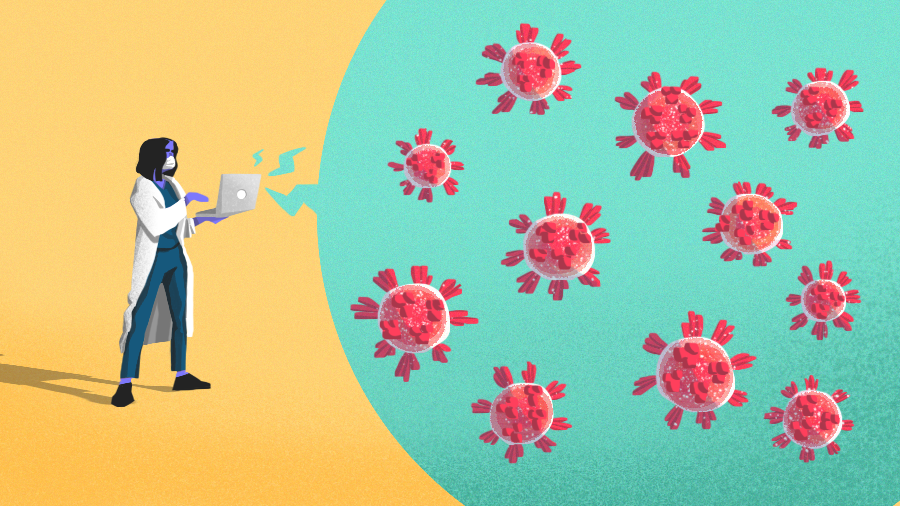As more people turn to telemedicine for ailments, the current infrastructure is bursting at the seams.
Suddenly, telehealth is mainstream.
Subscribe to the Crunchbase Daily
But with increased demand comes increased wait times. As such, some startups are working to help give people greater access to health care during a time in which the entire globe is facing a very serious health crisis.
This morning, New York-based digital health startup Pager announced it has developed an additional AI (artificial intelligence) feature specific to COVID-19 triage and risk assessment to its care navigation and telemedicine platform, which is offered white-labeled to health insurance payers and health system providers. The company has made it available globally to address the “unique challenges” COVID-19 poses to providers, payers and the public.
With so many people turning to virtual care (Pager’s own volume has spiked by 10 times in recent weeks), the wait times to talk to someone have also gone up exponentially, according to Pager CEO Walter Jin.
The platform can be deployed in a matter of days, according to Pager, and offers patients access to an AI-powered forward triage and virtual care clinicians.
As Jin explained to me, Pager’s bots will be able to distinguish patients that are at low, medium and high risk for having coronavirus. If they are deemed low risk, patients will be provided with detailed self-care instructions. Patients considered high risk will be immediately connected via phone or chat with a licensed nurse in their state to be assessed more thoroughly. If needed, they will then be connected to a state-licensed doctor who will provide personalized care instructions which may include guidance to the closest COVID-19 testing or health facility.
“What we’ve built, through our AI, is a triage solution that is designed specifically to flatten the curve,” Jin told me. “We’re trying to address this big problem in health care right now.”
Serving as a filter
Jin estimates that one-third of the cases that come in can be handled by AI, or Pager’s triage solution. The other two-thirds would be referred to a live chat with a nurse. And, about one-third of those will be referred to a telemedicine consult with a doctor or referred to a facility.
Pager’s process essentially filters out the hypochondriacs among us so that only the more serious cases are referred to doctors.
“We’re able to triage people properly and then send them to the right type of care based on their level of acuity,” Jin told me. “It’s all about access.”
 Pager says its solution will provide patients with “clear and specific directions” on how to get to/enter each facility and will also call ahead to the center. Patients pay through their insurance and co-payments, if any, depending on their insurance plan. Many payers have recently announced waiving telemedicine co-pays, according to Pager
Pager says its solution will provide patients with “clear and specific directions” on how to get to/enter each facility and will also call ahead to the center. Patients pay through their insurance and co-payments, if any, depending on their insurance plan. Many payers have recently announced waiving telemedicine co-pays, according to Pager
“People across the globe are scared and lack consistent, reliable information about symptoms, exposure and risks. With or without COVID-19, patients are confused, which is why they flock to emergency rooms where two-thirds of cases could have been handled virtually,” Jin said. “Unnecessary trips to the ER not only put these patients at greater risk for contracting the virus by leaving self isolation, they also place a massive strain on clinical resources which are already in short supply.”
Background
Pager, which was co-founded in 2014 by Uber founding CTO Oscar Salazar, has raised more than $62 million in debt and venture capital in its lifetime, according to Crunchbase data. About $33 million of that was just raised earlier this month, including a $22 million in a Series B financing led by Health Catalyst Capital that included participation from New Enterprise Associates (NEA) and Lux Capital, among others. Silicon Valley Bank provided the debt financing.
Previously, Pager’s white label SaaS technology has been offered through insurance providers and health care practices. It has built what it describes as a virtual care “companion” to help providers be able to offer telehealth options.
It came up with the idea for the triage addition after the first case of COVID-19 was diagnosed in Colombia in early March.
According to Pager, one of its customers – a subsidiary of one of the biggest insurance organizations in Latin America – saw a fourfold surge in virtual care chats. This overwhelmed its clinicians and health care infrastructure. To help, Pager created the COVID-19-specific triage protocol, which was deployed over the course of a weekend.
Now, Pager is rolling out the service in the U.S. where the pandemic is spreading quickly, as well as across the globe. Customers of its current virtual care service can add on the COVID-19 AI-powered feature while any health system or insurance company has the ability to implement Pager’s COVID-19 solution.
Hims & Hers
Meanwhile, wellness startup, hims & hers, recently launched its primary care service via its telemedicine platform. In addition to being able to treat conditions such as the flu, asthma, allergies and UTIs, it now offers a free COVID-19 self-assessment.
Like Pager, the startup says it is trying to relieve the pressure currently felt by primary care providers by giving patients more virtual options.
Dr. Pat Carroll, hims & hers’ chief medical officer, said the company was intentionally built on a digital platform “with safety in mind.”
Hims & Hers has had over 1 million medical visits take place through its platform since its launch in 2017.
“We feel confident in our ability to increase much-needed access to virtual care during this challenging time,” Carroll added.
Primary care services will be available in more highly populated states such as California, Florida, New York, Texas and Washington. All visits will be $39.
Hims & hers CEO and co-founder Andrew Dudum tells me that in the last few days alone, the company has had hundreds of people connect with a physician on hims & hers for a variety of treatments.
“On top of that we’ve seen growing utilization of our free COVID-19 self-assessment to help educate people and direct them towards appropriate next steps related to the virus,” he said.
The company, formerly known as hims, originally launched with a focus on men with products for skin care, erectile dysfunction and hair loss. The company started out by working with doctors to prescribe Finasteride and Sildenafil (active ingredient in Viagra) through its app or website. It shipped its first boxes to customers in late 2017 and saw $1 million in sales its first week.
Since then, it has evolved its business model to include women, raised over $200 million and grown to more than $100 million in revenue. The company reached unicorn status, with an over $1 billion valuation, in early 2019. Investors include Maverick Capital, Forerunner Ventures, 8VC, Redpoint and Founders Fund.
Illustration: Dom Guzman

Stay up to date with recent funding rounds, acquisitions, and more with the Crunchbase Daily.






![Illustration of a guy watering plants with a blocked hose - Global [Dom Guzman]](https://news.crunchbase.com/wp-content/uploads/quarterly-global-3-300x168.jpg)
67.1K Followers